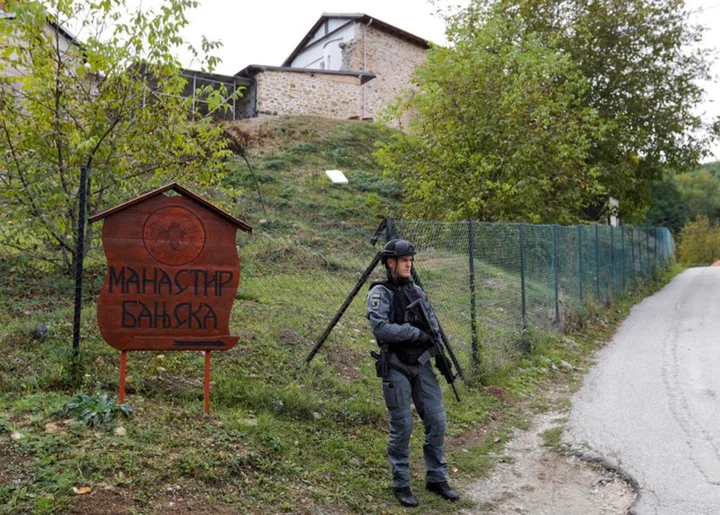JEDDAH, Saudi Arabia (AP) — Arab leaders, joined by Syrian President Bashar Assad for the first time in more than a decade, were holding an annual summit Friday in Saudi Arabia, with a focus on Sudan and other conflicts.
The meeting comes as Saudi Crown Prince Mohammed bin Salman pursues regional diplomacy with the same vigor he previously brought to the oil-rich kingdom's confrontation with its archrival Iran and regional proxies.
In recent months, Saudi Arabia has restored diplomatic ties with Iran, is ending the kingdom’s yearslong war against Iran-backed rebels in Yemen and has led the push for Syria’s return to the Arab League, 12 years after its membership was suspended over Assad's bloody crackdown against Arab Spring protests.
The Saudis have even offered to mediate between Ukraine and Russia, following a prisoner exchange deal they brokered last year.
As leaders from the 22-member league meet in the Red Sea city of Jeddah, attention is expected to shift to Sudan. The East African country's top generals — both of whom have been backed by Saudi Arabia and other Arab states — have been battling each other across the country for over a month, killing hundreds and sparking an exodus from the capital, Khartoum, and elsewhere.
Gen. Abdel-Fattah Burhan, leader of the armed forces, and Gen. Mohamed Hamdan Dagalo of the paramilitary Rapid Support Forces, agreed to a pact in Jeddah last week that promised safe passage for civilians fleeing the fighting and protection for aid groups. Saudi Arabia and the United States have meanwhile been leading international efforts to broker a lasting truce.
The fighting has killed over 600 people and caused tens of thousands to flee their homes.
The Arab League is also expected to reiterate its perennial criticism of Israel's treatment of the Palestinians at a time of soaring tensions.
In recent years, Assad's forces have recaptured much of Syria's territory from insurgents with help from Russia and Iran. Saudi Arabia had been a leading sponsor of the opposition at the height of the war but pulled back as the insurgents were eventually cornered in a small pocket of northwestern Syria.
“Saudi Arabia’s push to bring Syria back into the fold is part of a broader shift in the kingdom’s approach to regional politics,” says Torbjorn Soltvedt, a leading Mideast analyst at the risk intelligence company Verisk Maplecroft.
“The previously adventurist foreign policy defined by the Yemen intervention and efforts to confront Iran are now being abandoned in favor of a more cautious approach,” he said.
There are some Arab holdouts to Damascus' rehabilitation, including gas-rich Qatar, which still supports Syria's opposition. Qatar has said it won't stand in the way of the Arab consensus on readmitting Syria but would also not normalize bilateral relations without a political solution to the conflict.
Western countries, which still view Assad as a pariah over his forces’ aerial bombardment and gas attacks against civilians during the 12-year civil war, have criticized his return to the Arab fold and vowed to maintain crippling sanctions.
That will likely continue to hamper any reconstruction. Years of heavy fighting involving Assad's forces, the opposition and jihadi groups like the Islamic State group left entire villages and neighborhoods in ruins.
U.S. lawmakers are rallying to block the Arab effort to bring Assad back into the international community. House Foreign Affairs Committee Chairman Michael McCaul, a Texas Republican, declared the U.S. “must use all of our leverage to stop normalization" with Assad.
Democrats and Republicans on McCaul’s committee advanced legislation this week that would bar any U.S. federal agency from recognizing or carrying out normal relations with Syria’s government as long as it’s led by Assad, who came to power in 2000, following the death of his father.
The legislation would also plug holes in existing U.S. sanctions targeting Assad, and mandate the U.S. create a formal strategy to counter efforts by countries that do normalize relations with his government.
Lawmakers are taking a somewhat harder line than the U.S. administration has so far.
“We do not believe that Syria merits readmission to the Arab League," the State Department’s deputy spokesman Vedant Patel told reporters in Washington on Wednesday. He added that U.S. officials have raised this point “with our regional partners and with our partners in the Arab world.”
“Our position is clear. We are not going to normalize relations with the Assad regime and we certainly don’t support others doing that,” Patel said.
Patel said the administration is still committed to a U.N. Security Council resolution adopted in 2015 that endorsed a roadmap to peace drafted three years earlier. But several rounds of talks held over the years between Assad's government and the opposition went nowhere, and he has had little incentive to compromise with the beleaguered insurgents since Russia entered the war on his side eight years ago.
___
Associated Press writers Ellen Knickmeyer and Matthew Lee in Washington contributed to this report.









